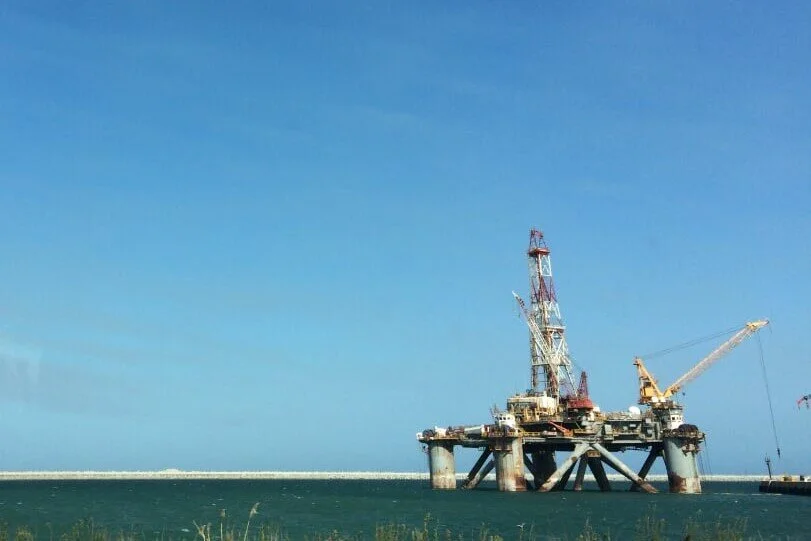Habitat Destruction
Thomas Morris
In our final instalment of our Rising Tides series, we cover habitas loss / destruction. The reason I covered this one last is that it is mostly a result of many of the threats we have already covered. To see what I mean, let’s take a further look...
Marine habitat loss or destruction is where the marine environment or a particular ecosystem degrades to a point where it is unable to support the animal and plant life that would usually reside there. This can be due to direct transformation, such as mining, dredging, construction or aquaculture. It is also due to indirect causes, mainly related to the four previous threats that we have spoken about in this series; ocean warming, acidification, pollution and over fishing.
An off-shore oil-rig. Photo: Thomas Morris @ulti_moose
As a result of this habitat loss, these environments stop providing what are termed ecosystem services, which are of immense ecological, social and economic importance. Ecosystem services are gifts to the populations around the ecosystem and the best way to illustrate what is meant by ecosystem services is to utilize an example. To do that, let us head to the southern tip of Africa and have a look at the kelp beds and temperate reefs that cover approximately 1000 Km’s of the south western coast of South Africa.
Researchers from the University of Cape Town recently published a paper(1) that identified the services this ecosystem provides and evaluated their economic worth. They identified direct (commercial, recreational and subsistence fishing and ecotourism) and indirect (coastal protection, carbon fixation, nutrient cycling, biodiversity, research and education, and recreation) goods and services that benefit the surrounding communities. The figure, ladies and gentlemen, is a staggering US$ 434 million per year, of which US$ 290 million directly contributes to South Africa’s economy through the above mentioned direct services.
This staggering amount of money comes at a time where almost 80% of commercially relevant marine species are being fully exploited or completely over exploited. Now, imagine that figure if we allow our fish stocks to recover? Or limit the amount of detrimental and toxic pollution into the oceans? Imagine if governments are able to limit carbon dioxide emissions and prevent the planet from heating more than 1.5 ˚C over the next 12 years? Is this the answer to our current environmental problems? To monetize everything?
Perhaps it is. In the previous articles within this series, I have looked at a variety of ways that you can make a difference. I’d like to summarize them here and add a few extra bits:
Awareness and education
You can’t make a change if you don’t know about it. Know what fish you are eating and whether it is sustainably caught. Try and live your life with as little waste as possible (Reduce, Reuse, Recycle). Talk to people if they don’t seem to get it and provide the complete picture, not just a small aspect of it.
Try and make a difference yourself
If you are in a space that allows you just a little bit of influence (e.g.: researcher, postgrad student, working for an NGO/NPO, a leader in anything, a writer for any form of media, etc.), utilize your platform to engage with a variety of stakeholders in your circle. Tag government officials in posts and ask “what are you doing about x?” Use your studies to research the effects of any of the above threats on a local scale and inform policy advisors on the results. Address restaurants, businesses and industries if you can see they are not doing the bare minimum.
Invest in sustainable, clean technology
“Every little bit counts” Utilize your greatest influence - your money – and invest in organizations, commercial ventures and industries that are doing it right. Do your research on everything you buy and try to keep it sustainable, clean and environmentally friendly. You can even find sustainable investments that are gaining some pretty good returns!
Be positive, stay motivated
In this world where bad news is good news, let’s start focussing on the things that make us happy. And I already know that what makes this planet happy, makes me happy … so let’s change the narrative. Start sharing success stories and make it easier for everyone to shift. Instead of moving away from fear, let’s move forward in hope.
And most importantly, don’t be a jerk about it
We live in a time where we are constantly bombarded from all side for our attention. I don’t respond to threats and rhetorical questions particularly well, I don’t expect anyone else to. Let’s be clear, kind and friendly in our messages and maintain the positivity. The waitron serving you that straw isn’t going to be able to do anything about it … but the manager or owner of the establishment might, if you treat him/her with respect.
Rising Tides is a series focussing on the current threats facing our ocean, how these are being tackled and what you can do to help
IF YOU’VE ENJOYED READING THIS ARTICLE, LOOK OUT FOR MORE RISING TIDES blogs FROM THOMAS AND FOLLOW HIM HERE @ULTI_MOOSE // @ULTI_MOOSE
References
1 - Blamey, L.K., Bolton, J.J., The economic value of South African kelp forests and temperate reefs: Past, present and future, J. Mar. Syst. (2017), http://dx.doi.org/10.1016/j.jmarsys.2017.06.003

